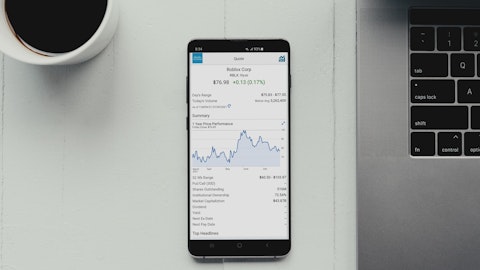But we’re now looking at channels and saying, how can we demand more out of our existing channels, not just demand more profit out of our existing channels, but demand better customer experience out of our existing channels. And we think we still have work to do there, and we think that will lead to, again, both more profitability and better interactions, better experiences between homeowners and service professionals. And I’ll just add one more thing on that, which is people have asked me the question, well, are you cutting marketing here in ways that’s kind of overstating the profit or where you’re borrowing from the future to cut marketing areas? Truth is we’re generally cutting marketing our performance channels. And so performance channels are near-term performance channels.
and brand spend is actually up year-over-year and will be up again year-over-year in Q4. So that part of the business is healthy, but we’re looking at all the channels and deciding what we want to do and demanding more, again in customer experience out of each of them, so that when we bring a homeowner to our platform, and when we bring a Pro to our platform, the interactions between those two are much more valuable for each other and for our platform.
Justin Patterson: Thank you.
Christopher Halpin: Thank you, Justin. Operator, next question.
Operator: Our next question will come from Ross Sandler with Barclays. Please go ahead.
Ross Sandler: All right. Hi, guys. Going back to Dotdash Meredith. So you talked about the strength in performance, but the premium side of the business, down 12%, I think was a tad worse than the industry although improving. So how do you feel about that? And then looking forward, how do we think about the cadence of digital ad growth at DDM in the context of the new session growth rates? Are we likely to see revenue run ahead or behind session growth in ’24? And is that like a function of ad load or improving CPM or some combo of those? How do we think about that? Thanks a lot.
Christopher Halpin: Okay. Thanks, Ross. For – when you compare to the market and think about overall digital advertising growth at Dotdash, I would blend the advertising and performance marketing lines. The third leg of digital is licensing, which is a little bit of a different beast. But we think of those on a blended basis when looking at comparables. That was down about 3.5% in the third quarter, which when you look at publishing peers, we actually felt like we were holding serve versus what we saw there. We’d like it to be better. We’ve got a little bit of demonetization going on versus third quarter of ’22 when we still had probably over add-load in some of the Meredith properties and some suboptimal traffic. So a little bit is a comp issue.
But overall, we view it as down 3.5% and we expect those numbers to be improved in Q4 even with a soft ad market in October. So in our mind, we feel good about the progress we’re making. There are small things that were headwinds like the impact of the labor – not small, but labor strike from Hollywood and in our entertainment categories. But we’re head down and looking to get those ad numbers to flat into growth. That talks to ’24. We’re not providing guidance yet, but when you look at the sessions, which you highlight, core should continue to grow even better if the actors’ strike got behind us and there was more entertainment comps to talk about – but core is going to be – total cor will be second derivative positive in Q4. Core should grow solidly, and we expect that to continue into next year.
So traffic will be a tailwind. Our monetization premium sales are soft right now. The programmatic CPMs even in this Q4 should be up year-over-year, and we think we’re outperforming the market on open market CPMs. So hopefully, advertising revenue – digital advertising revenue is flattish and then performance marketing as a source of strong growth in Q4 and continuing into next year. So we are optimistic on ’24 to drive digital – overall digital revenue growth and then given what we’ve said about incremental margins, that should drive continued improvement in profitability.
Christopher Halpin: Okay. Thanks Ross. Operator, next question.
Operator: Our next question will come from Brian Fitzgerald with Wells Fargo. Please go ahead.
Brian Fitzgerald: Thanks. A couple of follow-ups on DDM on D/Cipher. It sounds like there’s been an encouraging response as cookie deprecation kicks off in ’24. Where do you think penetration of that product could go for your general interest sites? And how are you thinking about potential revenue uplift there for both general interest and total DDM digital? And then Joe, any further thoughts on AI and defending copyrighted Evergreen content from DDM? Thanks.
Joey Levin: Sure. On D/Cipher, I think you hit the main point, Brian, which is intent is a very powerful indicator for ad performance and I think much more powerful – and based on our testing, much more powerful than cookies. And the good news is that cookies are being deprecated and so that market, I think, is sort of forced in that direction regardless. Our intent data is, we think, pretty good and also pretty unique. The best-performing ad platform in the world has exceptional intent. And we sort of follow in the wake of that with what we are able to gather in our platform with intent. And we expect that to really help overall Dotdash Meredith over the course of 2024. We’re seeing it in advertiser interest just in terms of responding to RFPs, but we’re also seeing it in advertiser spend in terms of making it a part of their campaigns.
And again, we expect that to continue, especially as we get better at mapping it broader across the Internet, broader across partners. And as it gets easier for partners or advertisers to buy that product from us, which is all stuff that we have underway. In terms of AI, look, we are going to defend our content. We’ve been clear about that. And I think that there’s one sort of small and relatively straightforward question that needs to be answered that, hopefully, if it’s answered in the way we expect it, we’ll get everybody to the table to get to reasonable conclusions, which is do these platforms have the right to take everybody’s content and transform it, and use it for the purpose that they’re using it? We think the existing copyright law is pretty clear that they do not have the right to do that, but it will probably take a court to reach that determination.
And once that happens, everybody can get together and figure out a solution that works for everybody in the ecosystem and that’s our plan. There’s a number of those suits underway right now, and we expect that there will be a number more of those over time.
Brian Fitzgerald: Thanks Joey. Appreciate it.
Christopher Halpin: Thank you. Operator, next question.
Operator: Our next question will come from Ygal Arounian with Citigroup. Please go ahead.
Ygal Arounian: Hi. Good morning, guys. Two questions. First on Dotdash and not to beat a dead horse here on the macro. But we’ve heard over the course of earnings, a lot more incremental concern on the consumer, especially in discretionary. And I know the e-commerce advertising and performance is really important. Do you guys have any insight there specifically that’s maybe different? I know you talked about the softer October but still sound relatively hopeful around holiday. Just any insight on that. And then on ANGI, you’re selling the roofing business, you’re paring down on services. Is that part of the business now where you want it to be? Or is there still more wood to chop there as well? Thanks.



